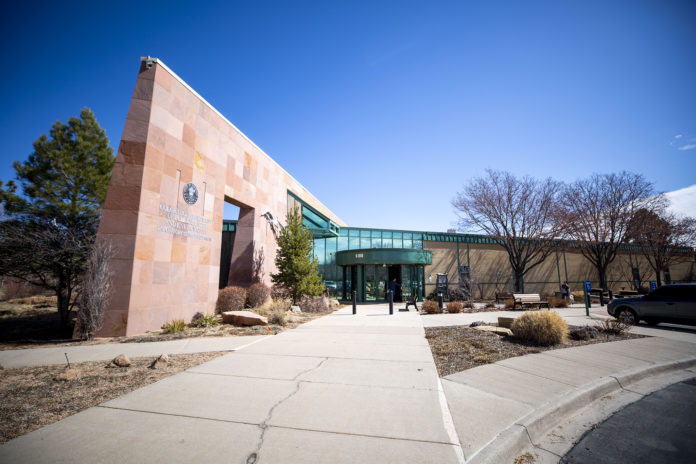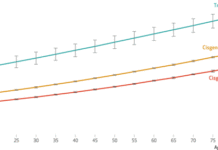
Colorado’s state health department will hold three more pop-up monkeypox vaccine clinics this week in Denver in an effort to curb the spread of the disease, which has been gaining a foothold in large U.S. cities.
The Department of Public Health and Environment said it was expanding availability of the two-dose shots after receiving an additional 300 doses of vaccine from a federal stockpile late last week. Colorado’s official case numbers are still in the single digits, but actual numbers are likely higher, said Nicole Comstock, CDPHE’s communicable disease branch chief.
“We’ve had cases with no travel history and who likely acquired their infection here in Colorado from community spread,” she said. “So, it is certainly possible that there are cases that have not been detected.”
The monkeypox virus can spread through skin-to-skin contact with an infected individual. It is rarely deadly, with a fatality rate of less than one percent.
Symptoms can last up to four weeks and include fever, headache, muscle aches, swollen lymph nodes and exhaustion. Typically, a rash or skin bumps develop after the onset of fever, beginning on the face and spreading to other parts of the body.
So far, all 8 of Colorado’s recorded cases have been among men who are gay, bisexual or identify as men who have sex with other men. None of the patients have been hospitalized, and all have recovered from the disease at home, Comstock said.
Due to limited supply, Colorado’s vaccines will be offered only to patients who also identify as gay, bisexual or men who have sex with other men. Other residents who believe they have been exposed to the virus are also eligible to sign up.
CPR’s Ryan Warner spoke more with Comstock about the spread of the disease in the state. The following interview has been edited for length and clarity.
How serious have the confirmed cases been?
Fortunately, none of our confirmed cases have needed to be hospitalized and everyone has survived. And the symptoms resolve on their own over time.
Are you left with scars after monkeypox?
I myself am not a clinician. But I have heard that it can be similar to what you might see for, say, chickenpox where people can have potential scarring.
This number of doses from the federal stockpile, that seems almost laughable. I mean, does (several hundred) doses—in a state of several million—make a lick of difference?
So that’s a good point. The Jynneos vaccine, which is the vaccine that our federal partners are providing through the strategic national stockpile to give to groups at highest risk of monkeypox infection, is limited in our nation and in the world. So we are working closely with our federal partners to get as many doses as they can allocate to us. They are allocating doses nationwide. And we anticipate in the future holding more clinics as we get more vaccines allocated to us.
From an epidemiological standpoint is the number (of vaccines) we have enough to slow the spread of something?
So we realize that, you know, (a few hundred) doses that we have currently does not go that far, but it is an effort to try to get people protected to try to mitigate further transmission of monkeypox. So, yeah, certainly we look forward to getting more doses of vaccines so we can reach the groups at highest risk at this point more thoroughly.
Why the focus on vaccinating men who have sex with men?
It’s important to stress that anyone can get monkeypox. Anyone is susceptible. So there’s really nothing unique to the gay, bisexual and men who have sex with other men population that makes them particularly susceptible to monkeypox. But currently that is a social group where we are seeing cases. This outbreak started in other countries and then came to the U.S., again, just within those social networks. That’s just where monkeypox is spreading at this time.
Is there a stigma to fight? In the early days of HIV, perhaps, you’ll recall that that disease was first called GRID, Gay Related Immune Deficiency. Is this a sensitive line to walk, do you think?
Yeah, we are being very careful. We do not wanna stigmatize our gay, bisexual and men who have sex with men populations. Again, this is where we are seeing the cases now, but anyone is potentially susceptible to monkeypox. Skin-to-skin contact is the most common way it’s transmitted. It’s not something that people need to be worried about getting in the grocery store. It’s transmitted very differently than COVID. Just being in the same airspace as someone does not necessarily put you at risk. So we really are just focusing our efforts based on what our epidemiological data is telling us.
Skin-to-skin contact poses the greatest risk, I have also read that it can be spread through the air. But it’s just not as transmisible in that form, correct?
Right. There is some evidence that monkeypox can be spread through like respiratory droplets. So someone who is infected with monkeypox is coughing or talking, those droplets can potentially be infectious if someone else were to be exposed to them. Unlike COVID, it’s thought to be much harder to transmit in that way. So you would need to spend lots of time probably within six feet of someone who is currently infected with monkeypox for probably several hours or more in order for that type of transmission to occur. The more likely way for monkeypox to be transmitted is if someone has a lesion or rash on their skin and you have direct contact with their skin.
What should people do if they’re concerned about this?
I think our message here is if someone has symptoms, that they seek medical care and get an assessment and potentially have testing done based on what their healthcare provider is assessing for them during that time frame. It would be important to not have contact with other direct contact with other people and not have sex during that time frame.
Is there decent testing in place for this?
At this point, the state health department laboratory is the only lab in the state that is offering monkeypox testing. The CDC at the national level is working hard to get commercial labs access to the testing supplies and reagents that are needed for monkeypox. So we suspect within the next few weeks there will be commercial lab testing, which will really open up the availability.
Is monkeypox now endemic to the United States, as it has been in parts of Africa for some time?
Not at this point. We’re seeing these localized outbreaks across the U.S. and public health is working hard to contain those and to protect people who might be at risk. So too early to say if it will become endemic. Our hope is that we can get our arms around this and really limit transmission to the point where the case counts go down.
For more information about monkeypox and to find out where to register to receive a vaccine, visit CDPHE’s website.








